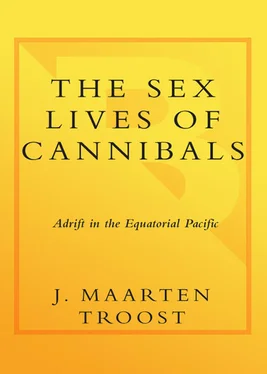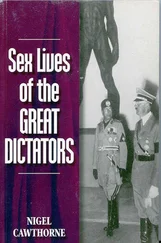J. Maarten Troost - The Sex Lives of Cannibals
Здесь есть возможность читать онлайн «J. Maarten Troost - The Sex Lives of Cannibals» весь текст электронной книги совершенно бесплатно (целиком полную версию без сокращений). В некоторых случаях можно слушать аудио, скачать через торрент в формате fb2 и присутствует краткое содержание. Город: New York, Год выпуска: 2004, ISBN: 2004, Издательство: Broadway Books, Жанр: Биографии и Мемуары, Путешествия и география, Юмористическая проза, на английском языке. Описание произведения, (предисловие) а так же отзывы посетителей доступны на портале библиотеки ЛибКат.
- Название:The Sex Lives of Cannibals
- Автор:
- Издательство:Broadway Books
- Жанр:
- Год:2004
- Город:New York
- ISBN:978-0-7679-1895-4
- Рейтинг книги:5 / 5. Голосов: 1
-
Избранное:Добавить в избранное
- Отзывы:
-
Ваша оценка:
- 100
- 1
- 2
- 3
- 4
- 5
The Sex Lives of Cannibals: краткое содержание, описание и аннотация
Предлагаем к чтению аннотацию, описание, краткое содержание или предисловие (зависит от того, что написал сам автор книги «The Sex Lives of Cannibals»). Если вы не нашли необходимую информацию о книге — напишите в комментариях, мы постараемся отыскать её.
The Sex Lives of Cannibals — читать онлайн бесплатно полную книгу (весь текст) целиком
Ниже представлен текст книги, разбитый по страницам. Система сохранения места последней прочитанной страницы, позволяет с удобством читать онлайн бесплатно книгу «The Sex Lives of Cannibals», без необходимости каждый раз заново искать на чём Вы остановились. Поставьте закладку, и сможете в любой момент перейти на страницу, на которой закончили чтение.
Интервал:
Закладка:
Once I had shoes, I set about getting a job. I had hoped that after two years, the credit card people and the student loan people would just forget about the past and let things slide, but this turned out not to be the case. “Remember that nice meal we had in Annapolis three years ago?” I said to Sylvia. “Well, after three years of interest and late fees and finance charges, that meal is going to cost me $1,500.” This did not please Sylvia. On a piece of paper she added our rent, our monthly grocery bill, utility costs, and various miscellaneous expenses, and divided it in two. “This,” she said, circling the figure, “is what you need to earn each month. Not a penny less.”
Fortunately, due to a terrible misunderstanding, I soon found myself working as a consultant to the World Bank. I am not exactly sure what it was that led the World Bank to believe I had any expertise in infrastructure finance. I had never even balanced a checkbook. I hadn’t even tried. There is not much reason to balance a checkbook when your checking account rarely tops the three-figure mark. And so, to the Third World countries who had the misfortune of working with me on their infrastructure projects, I wish to apologize. I was just kind of making it up as I went along. I hope you understand. I needed the paycheck.
It was a large paycheck too. A large, tax-free paycheck. I was grateful to the World Bank. I understood what they were doing. They were alleviating poverty one consultant at a time. To earn this generosity, I played a game of pretend. I pretended to feel comfortable in a suit. I pretended to know what a derivative was. I pretended to be aware of the Asian financial crisis. What Asian financial crisis? I thought. The only financial crisis I was aware of was my own.
At a luncheon hosted by the chief economist of the World Bank, I was seated beside the Minister of Infrastructure from Haiti. He described how painful privatization would be for his country. Thousands of people would lose their jobs. Many more would find themselves destitute. I nodded sympathetically.
Yes,” I intoned. “It will be painful, but necessary.”
That was my mantra at the World Bank— painful, but necessary. Privatization will lead to greater efficiency, which will lead to greater productivity, which will lead to an increase in capital, which will lead to more investment, which will lead to wealth and prosperity for all. I absorbed this like an infant absorbing the strange new world he finds himself in. I sat at my desk like a sponge soaking up the conversations in the corridor, internalizing the e-mail traffic, trying to decipher what my boss was talking about. Painful, but necessary .
It took many months, but eventually drinking water straight from the tap no longer seemed like a provocatively dangerous thing to do. Wearing shoes began to feel natural again. Restaurants ceased to be intimidating. After we got married, Sylvia and I honeymooned in Brittany. When a business trip took her to Brussels, I joined her for a long weekend in Amsterdam. We vacationed in the wine country of Sonoma. Somehow, inexplicably, by small increments, we became part of the cosmopolitan class. We lived well. We traveled comfortably. We read the right newspapers. We subscribed to the right magazines. Conversations alighted upon the IMF’s role in Turkey, the cuisine of Andalusia, market reform in China, the animal life of Zambia, and where to find white asparagus. We were adapting to millennial America.
At the World Bank, my coworkers and I discussed the pressing issues of the day. Which airline has the best business class, Singapore Airlines or British Airways? Which stock should I buy, Nokia or Qualcomm? Where should I buy a suit? Burberry’s or Brooks Brothers?
On a trip to the Middle East—business class, via a rest stop at the Park Lane Sheraton in London, with an automatic upgrade to suite—I spent two weeks at the InterContinental Hotel in Amman, Jordan, ostensibly to help organize a conference on infrastructure finance. I had little to do beyond ensuring that the PowerPoint projector worked correctly. The most pressing task was composing a birthday greeting to King Abdullah on behalf of the World Bank and the senior government officials attending the conference. It took the better part of a day before the French-speaking Moroccan, the robed Saudi clutching his prayer beads, and the jittery Syrian agreed that the felicitation was sufficiently flowery for the occasion.
When the conference ended I traveled to the south of the country to visit Petra, the golden city in the canyon. I had long fantasized about going to Petra. I had always envisioned approaching it after a hard journey across the desert, guided by Bedouin tribesmen, pressing on in the blazing sun, resting at the occasional oasis, where we would water the camels and pass the time discussing The Thousand and One Nights . Instead, I barreled through the desert in a chauffer-driven black Mercedes. I was with my boss, a Persian who often reminisced about the caviar served in the first-class section on Iranian Airlines before the revolution, and a professor from the Harvard Business School. They were engaged in an animated discussion about the deal Goldman Sachs had made to finance a new power plant in Qatar. We passed through Palestinian refugee camps. In the desert, young boys herded their goats. We were overtaken by an enormous white Cadillac with Saudi plates. Above, a squadron of military helicopters hovered near the Israeli border. It felt so odd passing all this life in a chauffer-driven Mercedes, and suddenly it occurred to me that I had become what I once loathed—a grossly overpaid consultant dithering in the sun. I was wasting my time. As you may have gathered, I am generally amenable to wasting time, but not like this. I felt like I was perpetuating a fraud, and while I can’t say that I felt any particular moral outrage, I did appreciate the ridiculousness of my situation, and if I was going to live a ridiculous life, I could do better.
Sylvia too had since become dispirited with life in Washington. For a long while, she had simply absorbed the sights, sounds, and realities of life in the most important city in the world. She was like an automaton. She had some distant memory of this world, but it felt like a long-forgotten dream. Confident now that she understood life in Washington, she began to form opinions. “This sucks,” she would declare after another day of forging partnerships, promoting synergy, attending conferences, disseminating knowledge on the Internet, producing vapor. In Kiribati, she had worked with the tangible. In Washington, she worked with the gaseous. How exactly will a link on a corporation’s website improve the lot of the two billion people living on less than a dollar a day? Presumably, they don’t have broadband access. Quite likely, they don’t even have electricity.
One evening, returning home after an excruciatingly long day, which was devoted solely to massaging the prose written by a nonnative English-speaking economist into something approaching coherence, I was pleasantly surprised by a proposition put forth by Sylvia.
“Would you be inclined to move to a small island in the South Pacific?”
“Oh yes please.”
And that is how two years after we returned from Kiribati, we once again found ourselves on a distant island, enveloped by the familiar blue waters of the Pacific.

AND SO AFTER A YEAR in Vanuatu, we found ourselves in Fiji, where Sylvia worked as the Regional Manager of FSP. I had decided to write a book—this book, as a matter of fact, and this time I would finish it. (Note to editor: Really.) Life in Fiji, as one can imagine, was very interesting. For instance, there was a coup recently, which was very exciting, though frankly, I think a lot of people in Fiji would be happier if the military traded in their guns for a good horn section.
Читать дальшеИнтервал:
Закладка:
Похожие книги на «The Sex Lives of Cannibals»
Представляем Вашему вниманию похожие книги на «The Sex Lives of Cannibals» списком для выбора. Мы отобрали схожую по названию и смыслу литературу в надежде предоставить читателям больше вариантов отыскать новые, интересные, ещё непрочитанные произведения.
Обсуждение, отзывы о книге «The Sex Lives of Cannibals» и просто собственные мнения читателей. Оставьте ваши комментарии, напишите, что Вы думаете о произведении, его смысле или главных героях. Укажите что конкретно понравилось, а что нет, и почему Вы так считаете.












